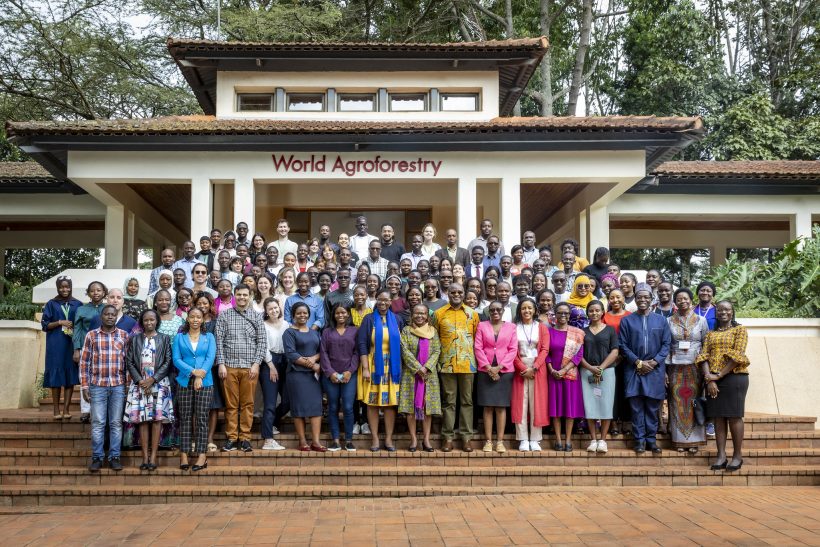
We were recently thrilled to welcome 125 young African and European career scientists into the One Planet Fellowship as Learning Partners.
The Learning Partners are early career scientists in climate science research nominated by mid-career scientists (Laureate Candidates) to participate in the Fellowship’s two-tiered mentoring program and other customized training.
Following admission into the Fellowship, the Learning Partners joined their mentors in Nairobi for a week-long workshop to introduce them to the Fellowship mentoring program. The workshop also served as a transition for the second and third Cohorts of the One Planet Laureate Candidates, ushering them in their new role as mentors to the Learning Partners.
Progress Monitoring Meeting
The week-long workshop was preceded by a two-day Progress Monitoring Meeting (PMM), which convened the mentoring pairs in the first tier of the mentoring program. The PMM allowed the pairs to reflect on the lessons learned and the progress made in their mentoring journey over the last two years.
The PMM also highlighted the achievements and successes of the program between the pairs and fete the mentors for their professional and personal support and guidance to their mentees.
A recurring theme among the pairs was the mentorship program’s ability to build the mentee’s professional capacity and encourage personal development.
Dr. Bridget Bwalya, a 2015 AWARD Fellow and a mentor to Dr. Miriam Makungwe, a 2020 One Planet Laureate Candidate from Zambia, hailed the mentoring experience as not only enriching for her mentee but also revealing and rewarding for her as a mentor.
“Miriam was coy and reserved when we started working together, but over time, and focusing on affirming her intellect and expertise in her research area, she has become more vocal. This is evident even from her presentation at this workshop,” Dr. Bwalya said.
Another widely attributed theme was the commitment exhibited by the pairs to their monthly sessions despite competing commitments.
Dr. Kowouan Florent lauded his mentee’s commitment to the mentoring meetings while he (the mentee) was in the Netherlands for the Advanced Science Training (AST).
“I was impressed by his dedication to attending our meetings despite being busy with his attachment in Europe. I think they (mentees) see the importance of the AWARD program, and that’s why they sacrifice, given that the effects are visible in their career development,” Dr. Florent said.
Launched in 2019, the One Planet Fellowship seeks to foster strong collaborations between African and European scientists, strengthening global efforts to address pressing challenges at Africa’s agriculture and climate change nexus.
During the launch of the training session, Dr. Susan Kaaria, Director of AWARD, underscored this commitment in her opening remarks.
“Socio-cultural norms greatly impact smallholder farmers’ resilience to climate change, especially women. This training is not only about forging research collaborations; it’s about reshaping strategies and amplifying voices that have long been marginalized,” she said.
While sharing her mentoring experience with the participants, Ms. Coulibaly Diakite Mariam, a 2020 Laureate Candidate from Burkina Faso, highlighted the check-in and reporting system incorporated into the program as a key feature of its success.
“The quarterly reporting to AWARD stood out for me as a mentee. It ensured that I was intentional with the check-in sessions with my Mentor and did not lax in implementing my roadmap,” she said.
See photos from the Progress Monitoring Meeting below
Visits to leading research and development institutions
The participants engaged in field visits to gain exposure to emerging technologies and trends in scientific innovations, visibility on some of the state-of-the-art laboratories, and local contexts for climate change adaptation.
They visited the CIFOR-ICRAF labs, the International Centre of Insect Physiology and Ecology (icipe) research facilities, and the Regional Centre for Mapping of Resources for Development (RCMRD).
The participants also engaged local farmers through the Appiculture Venture in Muranga County for insights into modern sustainable beekeeping practices for coping with the effects of climate change. They also visited the International Livestock Research Institute (ILRI)’s Kapiti Research Station & Wildlife Conservancy, learning about the current trends in livestock research and biodiversity for farmers’ climate adaptation.
“A key takeaway from the activities this week has been how I can incorporate a gender lens in researching the effects of different feeding systems among goat farmers in the southwest region of Nigeria,” said Fiwasade Rom-Kalilu, a Learning Partner from Nigeria and Livestock Researcher at Ladoke Akintola University of Technology in Nigeria.
“I already had the outline of my research formulated before this course. The training has, however, introduced a new concept for me to see how we can devise better feeding interventions to benefit the socio-economic livelihood of women farmers in Nigeria,” she added.
The 125 young researchers join the first cohort of 60 other young career scientists who joined the Fellowship in May 2023.
See photos of the workshops’ activities below


